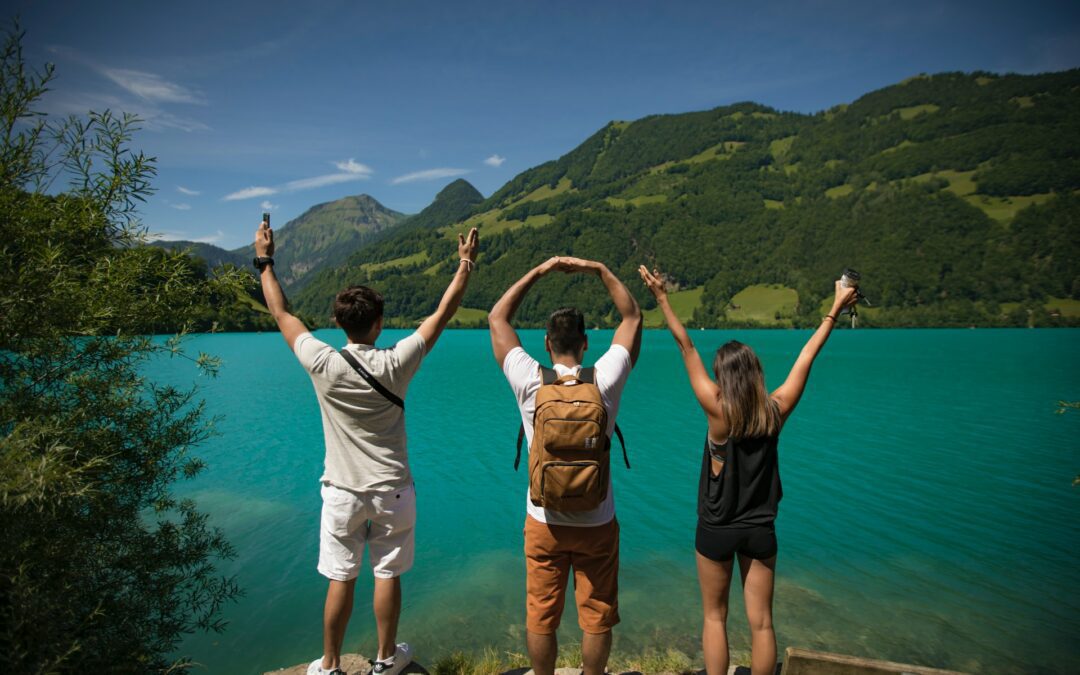|
|
In countries like the United States there is an epidemic of workers not using their holidays. Studies suggest that more than half of Americans don’t use all their paid vacation time, and that around 40% don’t use their vacation days at all.
Workers also often use their vacation time to get out of the office to complete other important tasks, rather than rest and recuperate. More than half of Americans do not take a leisure trip of more than four days each year.
Digital nomads are another group that are often guilty of skimping on holiday time.
Wait. Aren’t digital nomads already working in exotic places around the world? Potentially.
And don’t they already have a great work-life balance? Isn’t that the point? Yes, creating more space for leisure and exploration, and eliminating some of the challenges of being tied to a specific location, is one of the main aims of the digital nomad lifestyle. But I challenge anyone to achieve and maintain the perfect work-life balance!
Holidays aren’t just about visiting exotic places. They are about breaking your routine – whatever that might be – to give yourself a chance to get your head out of the sand, breathe, and reflect.
Digital nomads, often working long and unsociable hours while also trying to learn a new language, see all the sights, and plan the next phase of their journey, also need to take periodic vacations.
Read on as we look more closely at why digital nomads should factor vacation time into their lifestyles, and share our top tips on how to take a vacation when you are already travelling the world.
Why Digital Nomads Need Holidays
In most cases, it is inaccurate to think of digital nomads as individuals on an extended holiday, working online to finance their relaxing lifestyle.
Many, if not most, digital nomads work just as many hours as their counterparts in offices back home. Plus, they often have the challenge of working unsociable hours, as they need to align with the time zones of their clients. Then there is the other common challenge of the self-employed…
If you can work anywhere and anytime, you often feel like you should work anywhere and anytime. And when you work for yourself, the harder you work the more you gain, so it can be very challenging to place reasonable limits around your working hours.
Holidays aren’t just about travelling, even though this is something that many of us choose to do when we have the chance to get away. Holidays are about breaking routine, getting away from the constant low-level stress that often accompanies work, finding new inspiration, and returning to the core missions of our lives better than ever.

Here are some of the benefits that accompany taking a break from work:
1. Vacations Are Good For Your Health
The studies are in, and they show that taking time off work is good for your health. It is not the travelling, but rather stepping away from the pressure of responsibilities and the automatic nature of routine for a while that bring the benefits.
After a holiday you should find that you sleep better, your stress and anxiety levels are lower, your heart function and blood pressure improve, and overall, you are in better mood.
The modern work environment, whether in the office or remote, often comes with constant low-level stress built in. Deadlines, financial targets, and meeting customer expectations are all small stressors which are in constant action, meaning that our bodies are constantly flooded with low levels of stress hormones.
There have been many studies that show the detrimental effects on our health of chronic stress. But stepping away from work for a while, and actively putting these stressors aside, can reset our stress hormone levels and leave us feeling rejuvenated.
2. Holidays Can Reignite Inspiration
Inspiration often stagnates when you are stuck doing the same thing day in and day out. This undermines our ability to “think outside the box” and instead traps us very much inside the limitations of what we are doing.
We need to get out of this box headspace and let our minds wander to keep being inspired to create and innovate.
Digital nomads may have an advantage in this area. If you find yourself in a new place every other weekend and can spend your evenings exploring some of the most beautiful places in the world, you have great sources of inspiration.
But if you are still stuck working on the same tasks for 8-10 hours a day, it can be much harder to apply this inspiration than we imagine.
Plus, constantly having work tasks and worries in the back of your mind can diminish your ability to really appreciate the wonders on your doorstep. It is hard to fully immerse yourself in the local music scene when your mind is also trying to decide how to fix a particularly hard piece of code. Are you really feeling the atmosphere of the ancient temple that you are exploring when you are also concerned that you won’t meet this week’s deadlines?
So, taking a break can help you feel more inspired at work, and can also help you to feel more inspired by the opportunities presented by travel.

3. Breaks Can Boost Your Work Productivity
While taking time off might feel like it will put a big dent in your productivity, studies have shown the opposite to be true.
Chronic stress and tiredness decrease our focus and make it difficult to keep on task and give our best. Working for extended periods without breaks can reduce our ability to engage in deep work. So, while we might be working hard, it doesn’t mean that we are working well.
Regular vacations improve our focus, enabling us to produce better work in less time – the aim of most digital nomads – therefore boosting productivity.
4. Vacations Let You Re-Evaluate
Human beings are creatures of habit, and it is incredibly easy for us to get stuck in daily routines of habits that we don’t enjoy or aren’t good for us.
Digital nomads are not immune to this, even though the habits that we develop might look quite different. We are talking about bad habits such as fuelling ourselves on coffee rather than a healthy diet, skipping calls with family members back home to reach deadlines, and being too tired to go out, so watching Netflix instead of exploring our surroundings.
We might also think that we have it all figured out. We’ve decided how to manage our time so that we work during our most productive hours and are available during our most social hours. We have a mobile working environment that we think boosts our productivity, and we have a method for travelling and settling into new environments.
But once we settle into these routines and they become habit, we often stop evaluating how well they are working for us and whether improvements or changes are needed.
Taking yourself out of your normal routine, whatever that may be, often gives you the distance and the headspace that you need to see what really is and isn’t working and allow you to make changes for the better.

How To Vacation as A Digital Nomad?
The biggest challenge for digital nomads when taking a vacation is finding a way to not have to think about work for an extended period – at least one week and preferably two!
If you are the type of digital nomad that works for a company as a remote employee, you are probably ahead in the game. You should have holiday days built into your contract, and your company has mechanisms in place to cover your work when you aren’t there.
But many digital nomads work for themselves, which means that there is no one to cover you when you aren’t working.
Finding Time in Your Work Schedule
When this is the case, it is all about planning ahead.
You should be negotiating deadlines that account for the time that you won’t be working, and potentially putting in some extra hours in the weeks ahead of your vacation to make sure you have as much in place as possible before you take your holiday.
This is the hardest part of planning a holiday when you work for yourself. But you are generally more worried about deadlines and unsatisfied clients than you need to be. If you are clear with your clients about when you will be unavailable and make sure you have agreed appropriate deadlines with them, most clients tend to be very understanding.
You should have an out-of-office on your contact while you are holidaying to manage expectations, though you may want to give clients a way to contact you in case of a genuine emergency. Though you might want to agree what counts as a genuine emergency. For example, if you are a website developer/provider, a major hacker attack that has the potential to leak personal data is going to be an emergency, while needing to change a product category is not. They had warning of your holiday, they should have spoken to you earlier, or they will have to wait until you get back.
If you do plan on doing things such as keeping on top of your email while you are on break, you should set strict rules for yourself. These should include how often you can check, how long you can spend, and what you might reply to, as opposed to just flag for your return.
If possible, you should try and avoid checking communications as much as possible. Just a short email can quickly pull your mind back to the stressful projects that you are supposed to be taking a holiday from.

Where To Spend Your Break
As a digital nomad, one of the hardest things to decide could be where to take your vacation, especially if you are already in a place that others might consider an exotic holiday destination.
Your chosen holiday period can be a great opportunity to explore a place that holds special interest for you. If you are living in South America, maybe now is the time to visit the Inca ruins. Somewhere in Southeast Asia? Why not take a two-week trip to Tibet? If there is a place that holds particular interest, more free time and a clear headspace can enhance the experience for you.
Make sure you have your papers in order and check on your travel insurance. If your provider covers visits of digital nomads to their country or to other places, like SafetyWing, then you need not worry about this.
If one of the things you find stressful about the digital nomad lifestyle is adjusting to the local culture, why not take a break from it by heading to a more expat-friendly destination? It might feel like abandoning the principles of the lifestyle by heading to a western style resort for a while to relax and recharge. But the point is that you are taking some time out to recharge your batteries so that you can return to your more challenging lifestyle with more vigour.
If you decide to travel with someone else, and you have an option, choose someone who is not a digital nomad or a remote worker. If they are busy checking in on work, then you will be tempted to do the same. If they only reach for the device to take pictures, it will be easier for you to shut off and stay disconnected.
It might then just take a little bit of discipline to forget about your responsibilities and live in the moment for a few weeks. But this is something that most people struggle with when they are on vacation, it is not a unique challenge for digital nomads. It is one of the reasons we need holidays so badly.
Read our tips on living in the present as a digital nomad to get you started.
The Verdict
Just because you live in an exotic destination doesn’t mean that you don’t need a holiday. Vacations are about getting away from the constant stress of work and breaking your routines so that you can recharge your batteries, rethink, and come back to your core life and mission with new inspiration and invigoration.
Contrary to the belief of many, the digital nomad lifestyle isn’t an extended holiday with work on the side. Most digital nomads spend just as much time working as traditional workers, and often have the additional stressors of working for themselves, which can make it difficult to switch off. For this reason, digital nomads often need holidays more than other workers.
The key to planning a holiday as a digital nomad is to structure your work in such a way that you really will be able to disconnect from work commitments for about two weeks. This means appropriate planning and managing client expectations. But the truth is that most of us make this a bigger deal that it should be. Few of us are so vital that we can’t disappear for a few weeks.
It is then a matter of making the most of your time by choosing exactly where you want to spend your time, and who with. The additional time and headspace that holidays offer make it the ideal time to visit a place that holds particular interest for you.
Spend the time with someone you appreciate and that will help you switch off and relax.












